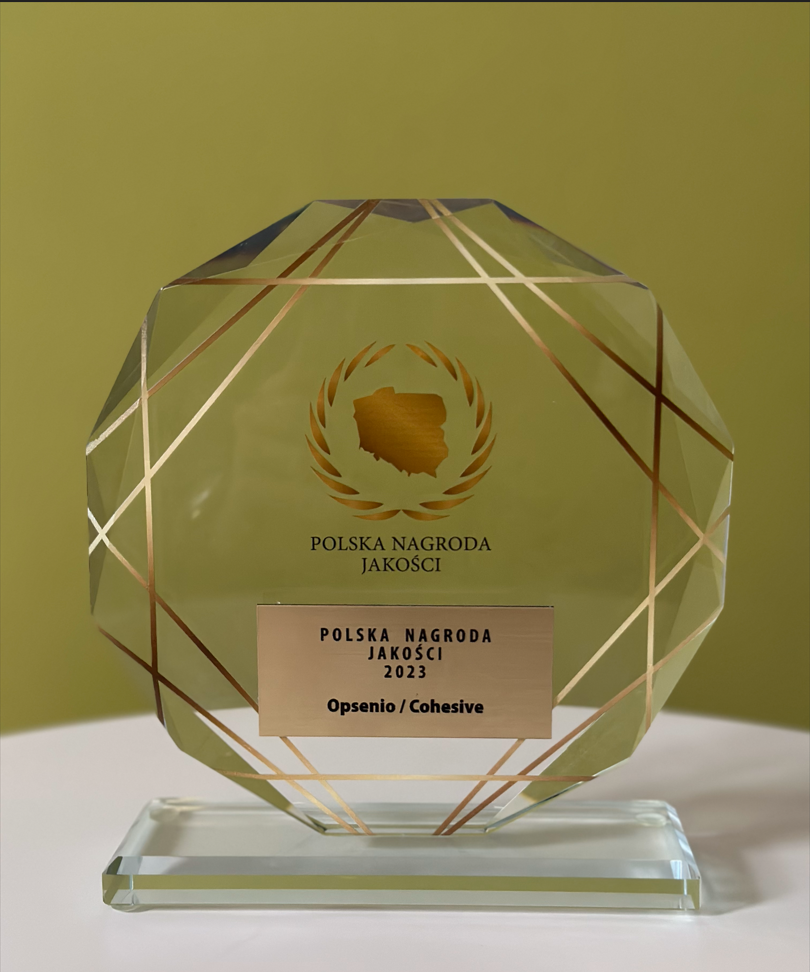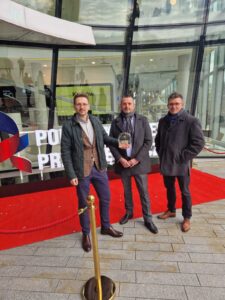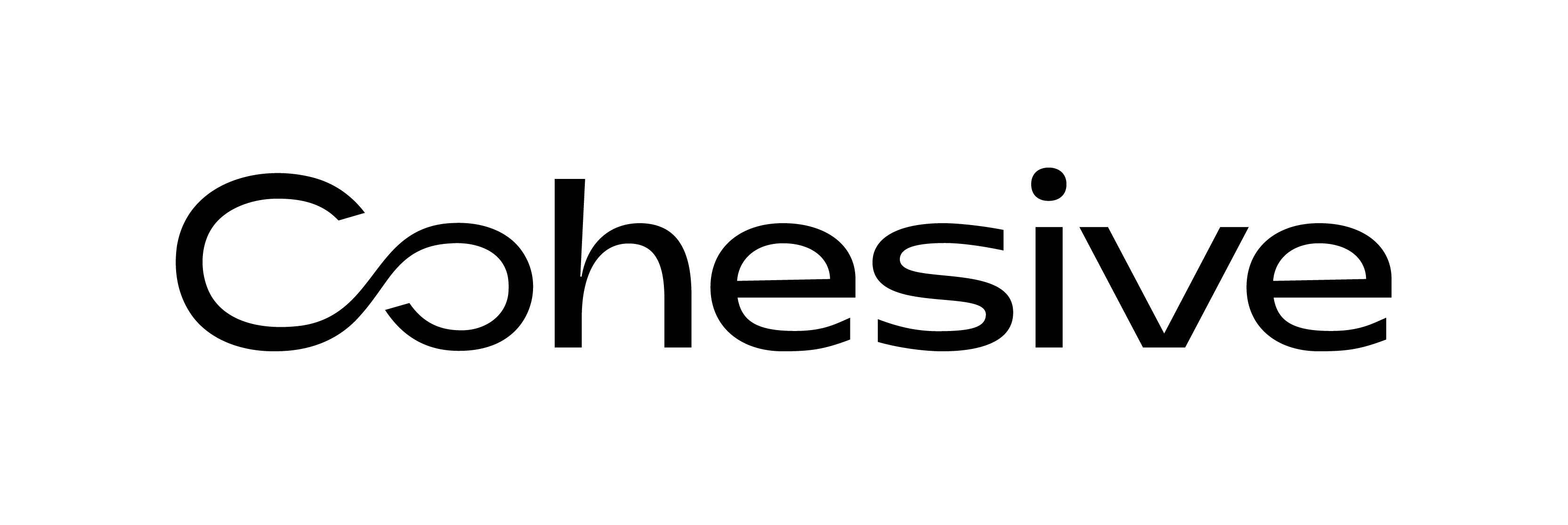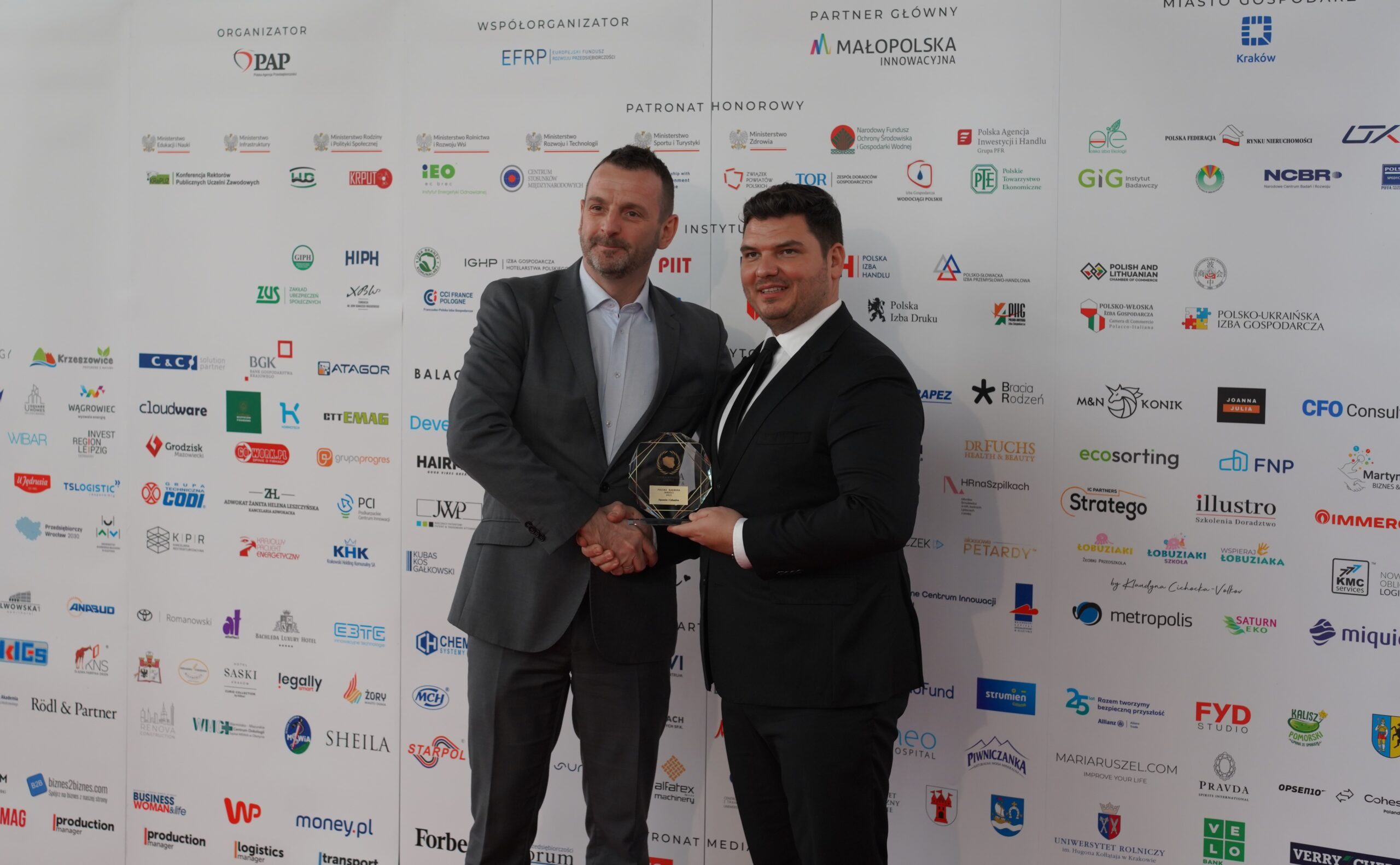Opsenio, now part of Cohesive Polska, has recently won a Polish Quality Award. The Polish Quality Award is awarded to companies, institutions and local governments operating in the Polish market for high management standards in their work environment and offering products of the highest quality. The winners of this distinction are characterized by their reliability and attention to the standard of services and products offered.

The jury consists of a representative of the Polish Enterprise Agency, the editor-in-chief of the Entrepreneurship Forum, the editor-in-chief of Biznes Plus, European Parliamentarians, local government specialists and experts in obtaining EU funds. The awards ceremony recently took place during the Polish Entrepreneurship Congress held in Krakow, Poland.
In the following interview with the founders of Opsenio; Jakub Rumian, Filip Dziedzic, and Tomasz Srebrny, we ask them their thoughts on this award and briefly about the history, projects, and new development perspectives as Cohesive Polska today.
Is the Polish Quality Award a surprise or an expected acknowledgment?
Jakub Rumian: “The nomination itself surprised us. Having it now is confirmation of our past efforts. Looking back on our history, the progress is evident—from a small team to a member of Cohesive Polska. This journey reflects determination, customer care, a qualified team, and the quality of our solutions.”
Filip Dziedzic: “In our specific industry of dedicated software, we understand that general recognition doesn’t come easily or quickly. Our path demonstrates determination, especially in our approach to the software development process. We never take shortcuts. We place great emphasis on the product design process, focusing on the business environment, individual needs, and customer capabilities. This results in the high quality of the final product, meaning the full usability of the new software.”
Tomasz Srebrny: “The comprehensive approach that Filip mentioned is a fundamental pillar that forms the basis of our philosophy across all fields. We focus on people from the very beginning. This is true not only in the context of our customers but also regarding our employees. Recruitment processes, competence development, commitment to tasks—we promote such attitudes. And it led us to the Polish Quality Award. For me, it’s an interesting conclusion of the Opsenio phase and an equally exciting start within Cohesive Polska.”
Does this comprehensiveness you talk about also apply to Cohesive Polska? Where did the idea for actions under the new brand come from?
Jakub Rumian: “It’s a natural progression. Our effective operations in the financial, transport, and utilities sectors made our small brand recognizable in the country. This resulted in the execution of increasingly advanced projects and expansion into new sectors and markets. Critical systems in companies were entrusted to us. Such trust is a real reward! Continuing the path of development and innovation, we reached the stage of becoming a member of Vetasi. This collaboration also turned out to be a success. Moreover, Bentley Systems recognized the efforts of all, and we quickly unified under the Cohesive Polska brand. Now, our capabilities extend globally!”
That sounds promising! And determination in pursuing set goals.
Filip Dziedzic: “It’s better described by the word “consistency.” By prioritizing quality from the beginning, we knew we couldn’t afford any compromises. And we can’t stand still. All projects we undertake represent 100% of our knowledge and energy from each team member. It’s also about choosing top-notch technologies and establishing business partnerships with experienced partners such as IBM, Siemens, Cohesive, and Bentley Systems. Quality surrounds us, and we prioritize it the most.”
You talk about the commitment of team members and choosing partners. While the latter seems obvious, managing recruitment processes seems challenging. Do you have proven methods for precisely searching for employees?
Tomasz Srebrny: “Of course, we use internal mechanisms that allow us to effectively handle new applications and select CVs. However, our goal is to get to know the specific person, their motivation, interests, and perspective on IT. People are our supreme value. To facilitate their work, we create personalized software. In the long run, this is only possible with a team that thinks similarly and is not afraid to initiate new actions or implement new ideas. I’ve just described the profiles of our employees simply. Thanks to them, our quality was born, and thanks to them, we can maintain these high standards. The role of leaders is only to create an optimal space for such activities.”

The process of creating this space sounds interesting. How do you control the projects being implemented in terms of managing employees?
Jakub Rumian: “We collaborate with people who approach their tasks professionally. We ensure precise guidelines and understand the client’s business conditions, and requirements for the new system. Each member of the project team knows and understands these needs and the methodology applied in each specific case. We implement a transparent division of responsibilities and assign appropriate roles in the team. Additionally, we establish rules for monitoring progress. All these elements, combined as a whole, are an integral part of the process of ensuring the quality of our software. The most important thing: everyone knows exactly what they must do, why they’re doing it, and what goal needs to be achieved.”
Transparency above all. Is it possible to operate with clients just as openly?
Filip Dziedzic: “Absolutely. Transparency is an absolute foundation for maintaining high standards of cooperation with clients. Whether working in an agile or cascading manner, we ensure that the ongoing work proceeds correctly. We emphasize honest communication with clients and their full engagement at every stage of activities. This way, everyone knows at any given moment what we are currently working on, and making modifications comes naturally.”
How do you improve communication between the team and clients?
Filip Dziedzic: “We use various advanced techniques for collecting and presenting data, often adapting to the realities of the project. When selecting tools, we take into account not only the reputation but also whether it is understandable to the client – this is not always the case (e.g. BPMN, UML diagrams). We always start with the interface design of the project and gradually adjust the logic to its elements. It’s a well-thought-out step-by-step approach. We often rely on the test-driven development approach. The quality of our software comes from carefully listening to customer needs at every stage and making every effort to respond to them as smoothly as possible.”
So can we say that the created software must be useful to talk about its quality?
Tomasz Srebrny: “It is just one of several components, but undoubtedly a crucial one. If the software meets requirements, is refined in terms of UI/UX, and employees can intuitively use it, creating a situation where their work genuinely becomes easier, we have an ideal scenario. The company can expect a faster return on investment and quickly optimize critical processes. The quality of the software cannot be detached from the real needs of the business. To ensure it, however, we must be sure that everything works as it should.”
And this is where the testing phase comes in?
Jakub Rumian: “Honestly, tests accompany us at every stage of software development. Only in this way can we guarantee the creation of a stable product. We introduce manual tests, believing that nothing can replace the human factor. Additionally, we automate actions to verify the correctness of the software on a large scale. I won’t list all possible tests now, but I want to emphasize one thing: this is a crucial stage necessary for creating high-quality products.”
Does conducting such advanced tests during production require a lot of commitment?
Filip Dziedzic: “We’ve developed an effective scheme of activities that facilitates our work. In each project, we try to use environments: development, testing, pre-production, and production. This is in the context of software development. There is also the maintenance phase, where it’s worth creating a reference environment.”
As we can see, activities don’t end with the product launch. The maintenance phase is equally important.
Tomasz Srebrny: “We’ve mentioned the comprehensive approach multiple times. We focus on building long-term relationships with clients, and post-implementation support is another stage confirming our commitment to maintaining high-quality software. The software life cycle does not end with production launch – it is worth remembering that.”
If you had to mention one value you aim for, what would it be?
Tomasz Srebrny: “We want to give our clients the feeling that they can count on a strategic partnership in IT areas. Real technological support is our goal. Consistently pursuing it has earned us the trust of clients and led us to the Polish Quality Award. Now, as Cohesive, we must further develop these standards even more strongly.”
What is your position within Cohesive?
Jakub Rumian: “Cohesive is expanding its reach significantly. Currently, we operate as Cohesive Polska, and in this international structure, we try to share our experience and draw strength to overcome further challenges. There are plenty of opportunities, and I can assure you that we will do our best to keep developing.”
What made the Opsenio brand merge with Cohesive?
Jakub Rumian: “What connects us with Cohesive is the constant pursuit of excellence using modern IT tools. Continuous improvement of companies is part of our DNA. Finding a partner who shares such a vision inspires us to make further efforts.”
Is there already a specific vision of the direction in which Cohesive Polska, as a team, will develop?
Filip Dziedzic: “We look to the future with optimism. Dedicated software is certainly an interesting element that we have added to Cohesive’s offer. We want to strongly support companies by creating personalized solutions. Thanks to the expanded product offering from Bentley Systems, we can efficiently carry out tasks and quickly respond to customer needs.”
And time plays a crucial role in today’s world…
Filip Dziedzic: “Exactly, which is why we focus equally on low/no code platform solutions such as the Mendix platform. We believe that in the coming years, this is a direction that many customers will want to follow. One thing we can promise: we won’t stop our efforts to make quality the hallmark of all our activities.”
An interesting plan is emerging.
Tomasz Srebrny: “Our history is full of stubbornness and non-obvious decisions that pay off. The Polish Quality Award is both a great summary of the stage behind us and a promising introduction to a new chapter of our adventure – a chapter entitled “Cohesive Polska”. We want to grow in this ecosystem and support the development of others, on an international scale.”
Receiving a Polish Quality Award is an extraordinary honour for the entire team. This is especially significant now, as the Opsenio team operates under the new name of Cohesive Polska. A lot has happened, and there’s even more ahead! The award for the quality of the software produced in this dynamic time shows one thing: that high standards are the foundation of our continued success.








